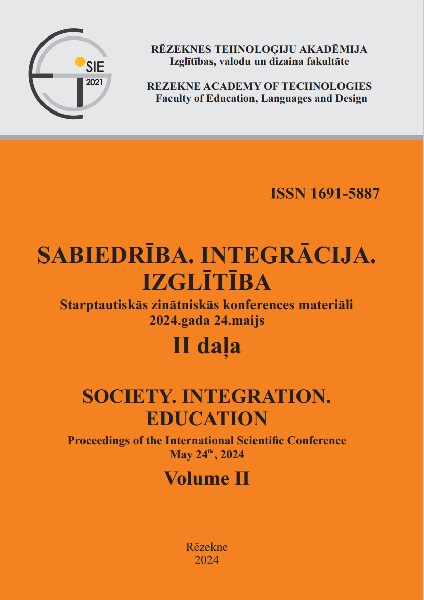HOME-BASED EARLY WRITING ACTIVITIES: THE PERSPECTIVE OF PARENTS IN A LATVIAN CONTEXT
DOI:
https://doi.org/10.17770/sie2024vol2.7909Keywords:
early writing, parenting, home-based writing activities, parents' perspectives on early writing, family literacy practicesAbstract
Students entering school with underdeveloped writing skills often face academic challenges. Addressing and improving these skills at the preschool level is a critical instructional goal. Early engagement in writing activities with parents and adults at home, beginning at a young age, is crucial in shaping children's writing identities and methods. While student motivation is vital in developing writing abilities, the role of parents in encouraging and nurturing these skills is equally important. This study aims to explore how parental involvement aids in developing early children's writing skills. Data were collected through surveys conducted with parents of 3-6-year-old preschoolers, focusing on their writing support and parenting practices. This research seeks to understand the role of parents in facilitating early writing activities at home. The study's primary objective is to examine parents' perspectives on enhancing their children's early writing skills within a home environment. Active participation by parents in their children's writing activities, including practices like reading together, encouraging daily writing, and providing constructive feedback, has shown positive outcomes. However, some parents reported challenges such as limited time or resources, affecting their ability to support their child's writing development effectively.
References
Aram, D., & Yashar, R. (2023). Parents’ understanding of early writing development and ways to promote it: Relations with their own children’s early writing. Frontiers in Education, 7, 1044907. DOI: https://doi.org/10.3389/feduc.2022.1044907
Aram, D., Elad-Orbach, L., & Abiri, S. (2017). Predicting Early Writing: The Role of Parental Writing Mediation and Children’s Private Talk During Writing. In C. McLachlan & A. Arrow (Eds.), Literacy in the Early Years (pp. 55-68). Springer. DOI: https://doi.org/10.1007/978-981-10-2075-9_5
Arrow, A., & Mclachlan, C. (2011). The emergent literacy approach to effective teaching and intervention. Perspectives on Language and Literacy, 37, 35-38.
Bigozzi, L., Vettori, G., & Incognito, O. (2023). The role of preschoolers' home literacy environment and emergent literacy skills on later reading and writing skills in primary school: A mediational model. Frontiers in Psychology, 14, 1113822. DOI: https://doi.org/10.3389/fpsyg.2023.1113822
Bindman, S. W., Skibbe, L. E., Hindman, A. H., Aram, D., & Morrison, F. J. (2014). Parental Writing Support and Preschoolers' Early Literacy, Language, and Fine Motor Skills. Early Childhood Research Quarterly. DOI: https://doi.org/10.1016/j.ecresq.2014.07.002
Both-de Vries, A. C., Bus, A. G. (2008). Name Writing: A First Step to Phonetic Writing? Does the Name Have a Special Role in Understanding the Symbolic Function of Writing? Literacy Teaching and Learning, 12(2), 37–55.
Creswell, J. W. (2014). Research Design: Qualitative, Quantitative, and Mixed Methods Approaches. Sage Publications.
Graham, S., & Hebert, M. A. (2010). Writing to Read: Evidence for how writing can improve reading. A Carnegie Corporation Time to Act Report. Alliance for Excellent Education.
Incognito, O., & Pinto, G. (2021). Longitudinal effects of family and school context on the development of emergent literacy skills in preschoolers. Current Psychology. DOI: https://doi.org/10.1007/s12144-021-02274-6
Incognito, O., Bigozzi, L., Vettori, G., & Pinto, G. (2021). Efficacy of two school-based interventions on notational ability of bilingual preschoolers: a group-randomized trial study. Frontiers in Psychology, 12, 686285. DOI: https://doi.org/10.3389/fpsyg.2021.686285
Kidd, J., K., Pasnak, J., Gadzichowski, K., M., Gallington, D., A., McKnight, P., Boyer, C., E. & Carlson, A. (2014) Instructing First-Grade Children on Patterning Improves Reading and Mathematics, Early Education and Development, 25:1, 134 151, DOI: 10.1080/10409289.2013.794448
Lonigan, C. J., & Shanahan, T. (2009). Developing early literacy: Report of the national early literacy panel: A scientific synthesis of early literacy development and implications for intervention. National Institute for Literacy.
McDowell, K., Jack, A., & Compton, M. (2018). Parent Involvement in Pre-Kindergarten and the Effects on Student Achievement. The Advocate, 23(6). DOI: https://doi.org/10.4148/2637-4552.1004
Puranik, C. S., & Lonigan, C. J. (2011). From scribbles to scrabble: Preschool children’s developing knowledge of written language. Reading and Writing, 24, 567–589. DOI: https://doi.org/10.1007/s11145-009-9220-8
Puranik, C. S., Lonigan, C. J., Kim, Y. S. (2011). Contributions of Emergent Literacy Skills to Name Writing, Letter Writing, and Spelling in Preschool Children. Early Childhood Research Quarterly, 26(4), 465-474. DOI: https://doi.org/10.1016/j.ecresq.2011.03.002
Puranik, C. S., Phillips, B. M., Lonigan, C. J., & Gibson, E. (2018). Home literacy practices and preschool children’s emergent writing skills: An initial investigation. Early Childhood Research Quarterly, 42, 228–238. DOI: https://doi.org/10.1016/j.ecresq.2017.10.004
Septiani, N., & Syaodih, E. (2021). Emergent Literacy in Early Childhood. DOI: https://doi.org/10.2991/assehr.k.210322.012
Silinskas, G., Sénéchal, M., Torppa, M., & Lerkkanen, M. K. (2020). Home literacy activities and children’s reading skills, independent reading, and interest in literacy activities from kindergarten to grade 2. Frontiers in Psychology, 11, 1508. DOI: https://doi.org/10.3389/fpsyg.2020.01508
Syomwene, A. (2022). Parental Involvement Strategies and Challenges in Development of Pupils’ Literacy Skills in the Implementation of Competency Based Curriculum in Early Years Education in Kenya. European Journal of Education and Pedagogy, 3(2), 53–59. Retrieved from: https://www.ej-edu.org/index.php/ejedu/article/view/273
Zhang, C., & Quinn, M. F. (2020). Preschool children’s interest in early writing activities and perceptions of writing experience. Elementary School Journal, 121, 52–74. DOI: https://doi.org/10.1086/709979
Zhang, S., Inoue, T., Cao, G., Li, L., & Georgiou, G. (2023). Unpacking the Effects of Parents on their Children’s Emergent Literacy Skills and Word Reading: Evidence From Urban and Rural Settings in China. Scientific Studies of Reading, 27. DOI: https://doi.org/10.1080/10888438.2023.2169147






